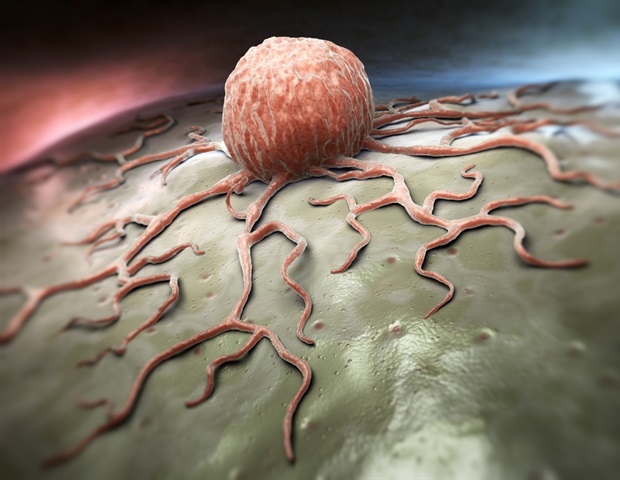
Researchers at Tel Aviv College have developed a brand new platform utilizing polymeric nanoparticles to ship drug pairs to particular most cancers varieties, together with pores and skin most cancers and breast most cancers. The researchers clarify that having each medicine arrive on the tumor website collectively considerably amplifies their therapeutic results and security profiles.
The research was led by Prof. Ronit Satchi-Fainaro and doctoral scholar Shani Koshrovski-Michael from the Division of Physiology and Pharmacology at Tel Aviv College’s College of Medication, in collaboration with different members of Prof. Satchi-Fainaro’s lab: Daniel Rodriguez Ajamil, Dr. Pradip Dey, Ron Kleiner, Dr. Yana Epshtein, Dr. Marina Inexperienced Buzhor, Rami Khoury, Dr. Sabina Pozzi, Gal Shenbach-Koltin, Dr. Eilam Yeini, and Dr. Rachel Blau. They had been joined by Prof. Iris Barshack from the Division of Pathology at Tel Aviv College’s College of Medication, Prof. Roey Amir and Shahar Tevet from the College of Chemistry at Tel Aviv College, and researchers from the Israel Institute of Organic Analysis, Italy, Portugal, and the Netherlands. The research was revealed within the prestigious journal Science Advances.
Prof. Satchi-Fainaro explains: “At the moment, most cancers therapy usually includes a mixture of a number of medicine that work synergistically to boost their anti-cancer impact. Nevertheless, these medicine differ of their chemical and bodily properties – equivalent to their charge of degradation, their circulation time within the bloodstream, and their potential to penetrate and accumulate within the tumor. Subsequently, even when a number of medicine are administered concurrently, they do not arrive collectively on the tumor, and their mixed results aren’t totally realized. To make sure maximal efficacy and minimal toxicity, we sought a approach to ship two medicine concurrently and selectively to the tumor website with out harming wholesome organs.”
The researchers developed biodegradable polymeric nanoparticles (which break down into water and carbon dioxide inside one month) able to encapsulating two totally different medicine that improve one another’s exercise. These nanoparticles are selectively guided to the most cancers website by attaching them to sulfate teams that bind to P-selectin, a protein expressed at excessive ranges on most cancers cells in addition to on new blood vessels fashioned by most cancers cells to provide them with vitamins and oxygen.
The researchers loaded the platform with two pairs of medication authorised by the FDA: BRAF and MEK inhibitors used to deal with melanoma (pores and skin most cancers) with a BRAF gene mutation (current in 50% of melanoma instances), and PARP and PD-L1 inhibitors meant for breast most cancers with a BRCA gene mutation or deficiency. The novel drug supply system was examined in two environments: in 3D most cancers cell fashions within the lab and in animal fashions representing each major tumor varieties (melanoma and breast most cancers) and their mind metastases.
The findings confirmed that the nanoparticles, focused towards P-selectin, collected selectively in major tumors and didn’t hurt wholesome tissues. Moreover, the nanoparticles efficiently penetrated the blood-brain barrier, reaching metastases within the mind with precision with out harming wholesome mind tissue.
Moreover, the mixture of two medicine delivered concurrently was far more practical than administering the medicine individually, even at 30 instances decrease doses than prior preclinical research. The nanoparticle therapy considerably lowered tumor dimension, prolonging time to development by 2.5 instances than commonplace remedies, and prolonged the lifespan of mice handled with the nanoparticle platform. Mice had a 2-fold larger median survival in comparison with these receiving the free medicine and a 3-fold longer survival in comparison with the untreated management group.
In our research, we developed an modern platform utilizing biodegradable polymeric nanoparticles to ship pairs of medication to major tumors and metastases. We discovered that drug pairs delivered this manner considerably enhanced their therapeutic impact in BRAF-mutated pores and skin cancers and BRCA-mutated breast cancers and their mind metastases. Since our platform is flexible by design, it might probably transport many various drug pairs that improve one another’s results, thereby enhancing therapy for a wide range of major tumors and metastases expressing the P-selectin protein, equivalent to glioblastoma (mind most cancers), pancreatic ductal adenocarcinoma, and renal cell carcinoma.”
Prof. Ronit Satchi-Fainaro, Division of Physiology and Pharmacology, Tel Aviv College’s College of Medication
The challenge acquired aggressive analysis grants from Fundación “La Caixa,” the Melanoma Analysis Alliance (MRA), the Israel Science Basis (ISF), and the Israel Most cancers Analysis Fund (ICRF). It’s also a part of a broader analysis effort in Prof. Satchi-Fainaro’s lab supported by an Superior Grant from the European Analysis Council (ERC), ERC Proof of Idea (PoC), EU Revolutionary Coaching Networks (ITN), and the Kahn Basis.
Supply:
Journal reference:
Koshrovski-Michael, S., et al. (2024). Two-in-one nanoparticle platform induces a powerful therapeutic impact of focused therapies in P-selectin–expressing cancers. Science Advances. doi.org/10.1126/sciadv.adr4762.

